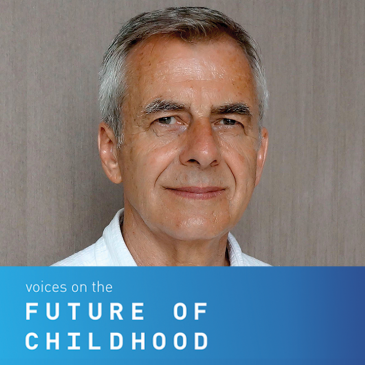For Part 3 of the Voices on the Future of Childhood series, we asked experts to offer their insights and predictions on what play will—or better yet, should—look like when families are released from isolation.
When we give the outdoors back to children
 Roger Hart, PhD, Professor of Psychology and Geography and Director of the Children’s Environments Research Group at the Graduate Center of the City University of New York, is currently completing Revisiting Childhood, a study of changes to children’s out-of-school lives over two generations in one town.
Roger Hart, PhD, Professor of Psychology and Geography and Director of the Children’s Environments Research Group at the Graduate Center of the City University of New York, is currently completing Revisiting Childhood, a study of changes to children’s out-of-school lives over two generations in one town.
Along with the loss of playmates, the loss of outdoor space has been extremely difficult for children during this period. The outdoors has always been the best space for children to play. They feel that they own it more than the rule-bound interior of homes and institutions; it is where they can run free and generally take more control of the space around them. But children’s freedom out-of-doors has deteriorated dramatically over the past few decades through a range of causes, from family work patterns, through parental fears of outdoor safety, to the emergence of digital technology. The coronavirus pandemic has now pushed this trend to its limit. There may, however, be a silver lining to this story: the pandemic’s impact may help energize a play movement that has been fermenting amongst parents groups across the country, especially in relation to the erosion of recess in schools and play in early childhood programs.
It’s not surprising that when we ask adults to describe their favorite play places as children, they rarely mention playgrounds, for these typically consist of fixed play equipment for physical play. They are so restrictive that they afford little freedom for children to engage in a wide repertoire of play, from sensory play, through imaginative play, to construction. Many parents intuitively understand this and would choose alternative play settings, such as nature play environments and adventure playgrounds, if they were more available. When children emerge from their homes yearning to play after this pandemic, parents would do no better than trust their children as experts while also turning to their own memories to find and create the best places for play to happen.
See more posts in this series:
Voices on the Future of Childhood
Bo Stjerne Thomsen | Helen Hadani | Jill Vialet | Kathy Hirsh-Pasek | Kathryn E. Ringland |
Makeda Mays Green | Roger Hart | Ronda Jackson | Rosanna Lopez

